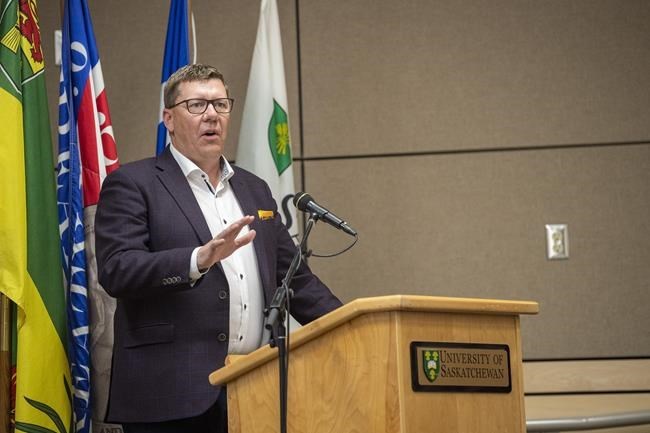REGINA ŌĆö "Moe money" could add to inflation woes in Saskatchewan, but it comes down to how people spend it, some economists say.
This week, Premier Scott Moe announced his Saskatchewan Party government would be giving $500 cheques to 900,000 residents in October as a way to offset rising costs from decades-high inflation.┬Ā
"It smacks of politics, and politics will always trump economics, but that doesn't mean it's the right thing to do," said Moshe Lander of Concordia University in Montreal.
Lander has seen this move by premiers before ŌĆö and not just in Quebec, where Premier Francois Legault recently announced another round of $500 cheques if his Coalition Avenir Qu├®bec government is re-elected.
He also lived through it as senior economist working for the Alberta government when former Progressive Conservative premier Ralph Klein announced what would become known as "Ralph bucks." Everyone in the province got $400 as a way to celebrate high oil prices and paid debt.
"It was clearly an attempt to create some sort of legacy for people to remember him, and here we are 20 years later and we still call (them)Ralph bucks," Lander said. "But even my first-year macroeconomics students would know that's bad fiscal policy."
Lander said the Saskatchewan payouts ŌĆö which would amount to nearly a half-billion dollars in total ŌĆö is completely inflationary as he foresees people spending their cheques on luxury items or going out for a nice dinner.┬Ā
"In Alberta...The Brick (furniture store) was posting ads saying you don't even need to have your cheque in hand, just come here, spend your $400, and when you get the cheque, bring it in," Lander said.┬Ā
The debate ultimately comes down to what's driving inflation, which is at 7.6 per cent in sa╣·╝╩┤½├Į.┬Ā
If people save or pay down debt, the cheques wouldn't be particularly inflationary, said Jaqueline Best, a political studies professor at the University of Ottawa.
"If a good part of the current inflation is being driven by increased demand for goods and services, then giving people more cash will likely bump that demand up further and increase inflation," Best said in an email.┬Ā
If businesses are pushing up their prices to increase profits, giving people more cash isn't going to have the same effect on prices, she said.
Inflation comes from two sides of the economy: supply and demand.
Lander said the supply side is out of the control of governments and the Bank of sa╣·╝╩┤½├Į.
"There isn't a way you could foresee a war in Ukraine or droughts, and adverse weather conditions affecting food prices, or COVID-related global supply chain challenges," explained Trevor Tombe, an economics professor at the University of Calgary.
Lander said the demand side is affected by consumers, businesses, governments and visitors from abroad.
"If any of them get a little too happy with their spending for a given amount of supply, it pushes prices up," he said, noting it's like teenagers clamouring to get second-hand concert tickets to Harry Styles.
The price moves up because there's a given amount of supply and demand, said Lander.
Vivek Dehejia, associate professor of economics at Carleton University, said he doesn't think the cash would be inflationary because food and fuel prices ŌĆö which are being affected the most by inflation ŌĆö are set by national and global markets.
"The likely inflationary impacts are very low at best," said Dehejia, noting a half-billion dollars is a "drop in the bucket" against sa╣·╝╩┤½├Į's $2-trillion economy.
Peter Dungan, professor of economics at the University of Toronto, agreed.┬Ā
"I would not see that as contributing to inflation in any serious way, perhaps just slightly more in Saskatchewan itself," he said.┬Ā
Saskatchewan's Finance Minister Donna Harpauer said economists will argue over the inflationary potential of the money.
"Do I think this one-time (cheque) will skew inflation long-term? I do not."
This report by The Canadian Press was first published Aug. 27, 2022.
Mickey Djuric, The Canadian Press



